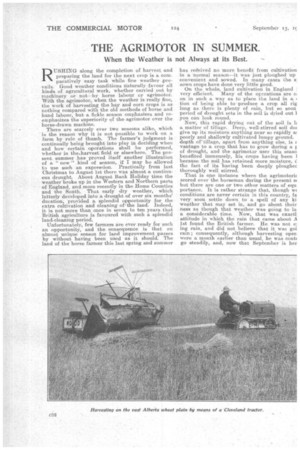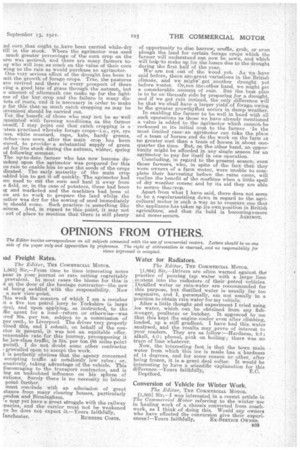THE AGRIMOTOR IN SOMMER.
Page 28

Page 29

If you've noticed an error in this article please click here to report it so we can fix it.
When the Weather is not Always at its Best. —
RUSFIING along the completion of harvest and preparing the land for the next crop is a comparatively easy task while fine weather .prevails. Good weather conditions naturally-favour all kinds of agricultural work, whether carried out by machinery or not--by horse labour or agrimotor. With the agrimotor, when the weather is really fine, the work of harveeting the hay and earn crops is as nothing compared with the old methods of horse and hand labour, but a. fickle season emphasizes and reemphasizes the superiority of the agrimotor over the horse-drawn machine.
There are scarcely ever two seasons alike, which is the reason why it is not possible to work on a farm by rule of thumb. The farmer's judgment is continually being brought into play in deciding when and how certain operations shall be performed, whether in the,harvest:field or elsewhere. The present summer Jias proved itself another illustration of a " new" .kind of season, if I may be allowed to use such an expression. Practically from last Christmas to August let there was almost a continuous drought. About August Bank Holiday time the weather'broke up in the Western and Northern parts of England, and. more recently in the Home Counties and the South. That early dry weather, which latterly developed into a drought of over six months' duration, provided a splendid opportunity for the extra cultivation and cleaning of.the land. Indeed, it is not more than once in seven to ten years that British agriculture is favoured with such a splendid land-cleaning period. Unfortunately, few farmers are ever ready or such an opportunity, and the consequence; is that an almost unique season for land improvement passes by without having been uSed as it should. The land of the horse farmer the last spring and summer
has reckived no more benefit from cultivation in a -normal season—it was just ploughed up convenient and sowed. In many cases the st sown crops have done very little good.
On the whole, land cultivation in England : very efficient. Many of the operations are c; on in such a way as to plane the land in a ; tion of being able to produce a crop all rig long as there is plenty of rain, but so soon period of drought sets in the soil is dried out l you can look round.
Now; this rapid drying out of the soil is h a matter of tillage. Deep, well-stirred soil do( give up its moisture anything near so rapidly a! poorly and shallowly cultivated lumpy ground. depth of' tillage, apart from anything else, is c vantage to a crop that has to grow during a of drought, and the agrimotor user this seaso benefited immensely, his crops having been 1 because the soil has retained more moisture, 1E the fact of its 'having been deeply ploughec thoroughly well stirred.
That is one instance where the agrimotoriE scored over the horseman during the present s( but there are one or two other matters of equ; portanee. It is rather strange that, though wc conditions are never certain in this country, fa very soon settle dawn to a spell of any ki weather that may set in. and go about their ness as though that weather was goingto in a considerable time. Now, that was exactl attitude in which the; rain that came about A 1st found the British farmer. He was not e: ing rain, and did not believe that it was goi rain ; consequently, although harvesting oper; were a month earlier than usual, he was cont( go steadily, and, now that September is her
aid corn that ought to,have been carried while.dry till in the stook. Where the agriraotor was used much greater percentage of the corn crop en the Arm was secured, and there are many farmers to ay: who will lose as much on the value of their coral wing to the rain as would purchase an agrimotor. One very serious effect a the drought has been to mit the growth of forage crops. True, the pastures ave revived and there is every prospect of ther eing a good bite of grass through the autumn, but o amount of _aftermath can make up for the lightess of the hay crop and the failure in many dis -icts of roots, and it is necessary in order to make p for this that a-s much catch cropping as may be mvenient should be carried out_
For the benefit of those who may not be so we! :cluainted with farming conditions as the farmer imself, 'I may point out that catch cropping is a stem practised waereby forage crops—i.e., rye, rye !ass, white mustard, rape, kale, hardy greens F:tches—are sown after the main crop has been "cured, to providea substantial supply of green ed for live stock during the autumn, winter, spring id folloaving summer.
The up-to-date farmer who hasnow become de3ndent upon the agrimotor was prepared for this cc rain to enable' him to sow the seeds of the crops dicated. The early maturity of the main crop tabled him to get it off quickly. The agrimotor had ten used to cut the corn and haul it away from e field, or, in the ease of potatoes, these had been ig and marketed and the machines had been a ice set to work to prepare the land whilst the .ather was dry for the sowing 'of seed inimediately in should come. Such practice. is aomething like isiness. And, in regard to this point, it may no out of place to mention that there is, still plenty
of opportunity to disc harrow, scuffle, grub, or even plough the land for certain forage crops which the farmer will understand can now be sown, and which will help to make up for the losses due to the drought during the first half of the year.
We, are not out of the wood yet As we . have said before, there are/great variations in the British climate, and we might'. get ',another drought yet before winter. Oracon the.other hand, we might get a considerable amount of rain. But the best plan is to be on. thelsafe side by preparing or a drought, and if we get rain instead, the only difference will be that we shall have a larger yield of fOrage owing to the greater growthalhat occurs in dampweather. In enabling the farmer to bewell in hand with all such operations as those we have already mentioned a value is added to, the agrimotor which cannot/ be reckoned in its initial cost to the farmer. 'In the most limited' case, an agritnotor can take the place of a team of horses and do the work on the farm at no greater cost than a team of horses in about onequarter the time. But, on the other hand, an opportunity might be afforded in any single season for an agrirnotor to pay for itself in one operation.
Concluding, in regard 'to the present season, eaten those farmers, who, in spite of the 'fact that they were owners of a farm motor, were unable to complete their harvesting before the rains came, will realize the benefit of the maehine when a little spell of dry weather comes; and by its aid they are able to secure thekrop.
Apart from what I have said, there does not seem to be a regularasettling down in regard to the. agricultural motor in such a way as to reassure one that the appliance has taken up its own position in British agriculture-, and that' its hold is becomingamore and MOM' secure. A.ORIMOT.
































